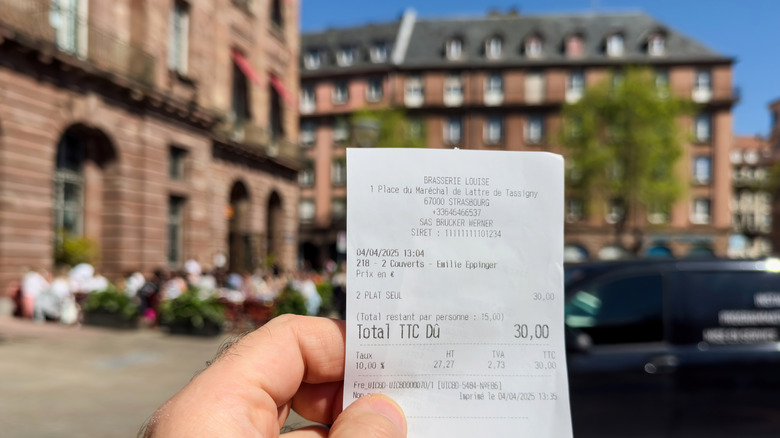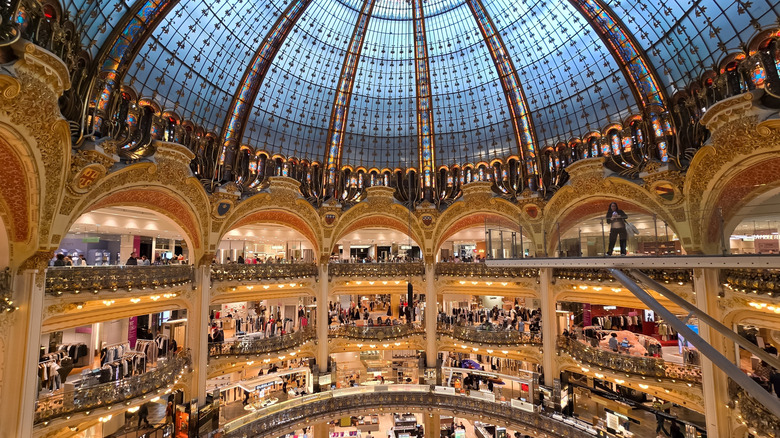Here's What It Means If Your Receipt In France Has 'TTC' On It
Considering the language barrier and the different currency, how to work out prices during your trip to France can be challenging. To add to this confusion, France has a different way of expressing the tax breakdown on receipts, which makes understanding receipts a little intimidating. The meaning of your receipt in France, however, becomes quite consumer-friendly once you know to look out for your new best friend: TTC, short for "toutes taxes comprises," which translates into "all taxes included."
When you look at a bill in France, you will typically notice a three-part breakdown: the price before tax, which in French translates to "hors taxe"(HT); the amount of the valued added tax (VAT), which in French reads as "taxe sur la valeur ajoutée" (abbreviated as TVA), and then the final TTC price including all taxes. Perhaps not the most glamorous of French terms, but now you can add TTC to your list of essential words and phrases to know before your trip to France. Knowing what to anticipate when you look at your receipt in France can avoid unwelcome surprises and even help you save a little money.
Do you really have to pay the TTC amount shown in the receipt?
The simple answer is yes, the TTC price is the amount you will be expected to pay. The tax rates in France vary according to the product or service. As a rule of thumb, the general VAT rate for most goods and services in France is 20%. One of the welcome exceptions is food that is taxed at a lower 5.5% rate if you buy it in a market, shop, or takeout, and 10% if consumed onsite. You will also find the lower 10% rate applied to movie tickets and tickets for live shows, while the 5.5% is applied to books and admission to parks, exhibitions, and museums. For example, your delicious plat du jour (daily special) for two at a brasserie (brewery) in Strasbourg might show €27.70 HT plus €2.73 VAT totaling up to €30.00 TTC. For the most part, you don't need to worry about working out the math. Restaurant menus, and even those enticing specials handwritten on the day's board, are already advertised at the TTC price. As we have now learned, this means that it includes the tax, so the advertised price will be the total amount charged. Simple, isn't it?
In general, retail prices, accommodations, and attractions are also advertised at the final TTC prices. One notable exception is the pesky tourist tax added to the nightly price of a hotel or short-term rental, which is one of the annoying costs that many tourists don't prepare for ahead of their trip to Europe. The amount of the tax is not subject to VAT so it will be not be included in the TTC total. The amount of the tourist tax varies depending on the location and accommodation, ranging (at this writing) anywhere from $0.25 at a campsite to $5 at a luxury hotel. Keep in mind that this tax can quickly add up, as it is calculated per person, per night.
You may want to hold on to your shopping receipts in France
The good news is that, as a visitor, in certain cases you may be able to claw back some of the tax amount. You can request a VAT refund on purchases over €100 at eligible merchants, as long as you are not a resident of the European Union, you are over the age of 16, and haven't stayed in the country for more than six months. Many shops in France offer tax refund services, including luxury brands, airport shops, and large department stores. The main Parisian temples of retail even have a dedicated counter to help you with the process, such as the case in Printemps, Le Bon Marché, La Samaritaine, and the stunning Galeries Lafayette — which is a perfect destination to visit if you only have a one-day trip in Paris.
Keep in mind that, similar to requesting a VAT tourist tax refund in Italy, you will need to be able to show your receipts at the airport in order to get your VAT refund. You can either have your form stamped by a customs officer, which you will then mail back to the retailer, or you can get an electronic stamp from one of the designated terminals known as "PABLO," in which case the process will be fully digital.
France has introduced a measure to reduce waste that means that receipts for everyday purchases will not be printed automatically. Don't be surprised if the cashier asks you whether you would like a receipt printed out, which in France is sometimes referred to as a "ticket" or "facture." If you prefer to keep a paper trail of your expenses, if you are buying an item that carries a warranty, or if you intend to claim back the VAT, make sure to ask for your printed receipt s'il vous plaît.


